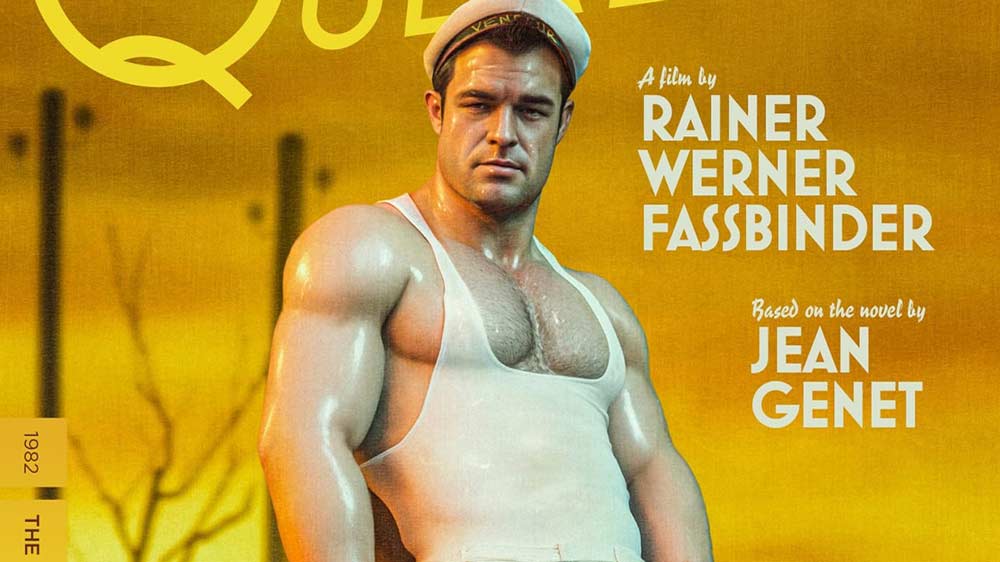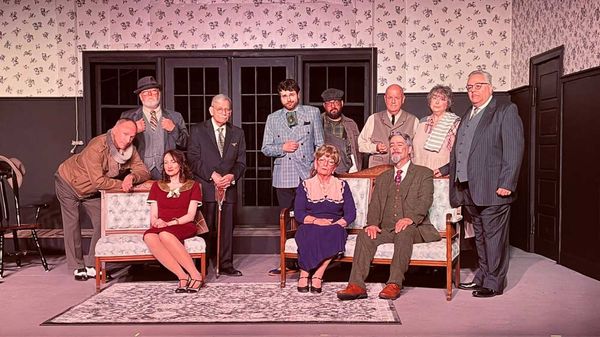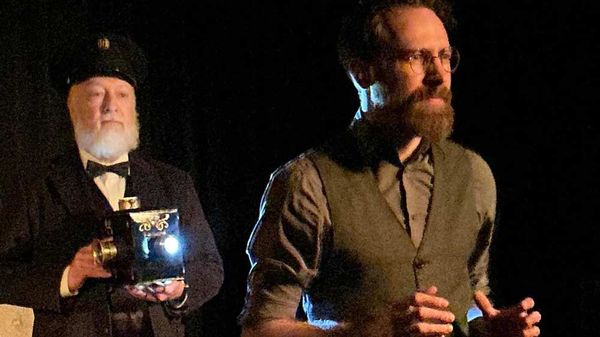April 11, 2011
The Bad Seed
Steve Weinstein READ TIME: 5 MIN.
Since its debut on Broadway in 1954, The Bad Seed has seen a couple of revivals in New York. A friend insists that a pretty young actress named Britney Spears once performed the title role. Maybe. All I know is that this has been one of the major staples of drag queens.
And why not, with its overwrought female characters, its painfully obvious story line, and especially what must be the juiciest role for any pre-teen girl? Certainly Helen Keller in the Miracle Worker or Ann Frank are conventionally "better" roles. But Rhoda, the bad seed of the title, is evil. She makes Damien in The Omen look like Tiny Tim. Damien is bad, but he wears his evil on his sleeve. Rhoda is pure deviousness, a cunning little vixen, all malice inside and simpering cuteness outside. The Damian reference fits, though, since the one other film this is closest to is Rosemary's Baby.
Fortunately, S. Barton-Farcas, the director of the pitch-perfect production being done by Nicu's Spoon, an off-off-Broadway company, has found the perfect Rhoda. Lee Eden looks even more sugary-sweet than Patty McCormack, who so famously played the role in the film. She also has down the sinister side-glance, the nasty smirk when no one's looking, the nonchalance in the face of her very, very evil deeds.
I wouldn't be surprised to see this 11-year-old actress on Broadway very soon. I'll be more surprised if I don't (or when she grows up, Regina in The Little Foxes).
If the other actors range from excellent (Wynne Anders as the good-natured nosy landlady Monica Breedlove) to just above community theater, that's OK. Barton-Farcas has taken Maxwell Anderson's adaptation of a popular novel from the early '50s and directed it straight -- that is, no one has any double takes or smirks at their lines.
This makes this ridiculously plotted drama all the funnier. Anderson broadcast the Big Idea that underlies the play -- that some people are inherently evil and that they may well pass on their character to their descendants -- in billboard-sized letters or maybe skywriting.
Anderson stacks the deck by having Rhoda's grandfather (who makes a brief appearance to reveal something terrible) be a semi-retired detective writer and another character an active mystery writer.
You'd think that would come in handy, considering that a little boy drowned under mysterious circumstances at a school outing. Then, soon after, the janitor to Monica and Rhoda's family burns to death in a mysterious fire. Rhoda's connected in all this; and though it's circumstantial at best, there's a feeling that much of this little crowd in a Florida Panhandle city is circling the wagons.
The pro mystery writers don't pursue these juicy deaths, however; instead, the private world of Rhoda's evil takes over Rhoda's mother, until she becomes a blithering basket case (this being the '50s, such things were barely noticed). Rhoda's mother, not a very strong-willed or self-sustaining military wife, must face some terrible moral decisions without the long-distance comfort of her husband.
Katie Labahn doesn't erase what is the most indelible performance in the film after Patsy McCormack, that of Eileen Heckart, the only one of the cast -- all of whom were brought over from the Broadway production -- to get an Oscar nomination. Along with McCormack, it's Heckart's over-the-top whiskey-and-cigarettes drunken tirades that have helped make The Bad Seed one of the cornerstones of camp drama. Making Mrs. Daigle an invalid confined to a wheelchair does add another layer of poignancy to her fall into barely self-controlled madness. (And isn't it refreshing to see an actress, herself apparently wheelchair confined, taking on a role that didn't call for it -- even if the actor playing Mr. Daigle looks closer to her son, or at least nephew.)
But there's one more character that's equally loopy. In the film, Leroy, the building janitor, is played as observant but dim-witted, resentful of his betters but subservient. In this production, Tim Romero is younger, better looking and, most important, sexier, in a grease-jockey kind of way.
There's a mini-soliloquy left out of the film in which Leroy sums up the three women living in the building with a not-so-veiled sexual attraction to Rhoda's mother. His verbal sparring with Rhoda, which reveals that this low-life is the only one who sees through her facade, has a touch of menace to it. It gives a nasty edge to his interest in pretty little Rhoda's doings about town.
There are other liberties the film script took with the original play. I won't reveal them here so as not to spoil the fun for the film fans that should be running to the hole-in-the-wall South Midtown theater. The Hollywood Code forced certain changes in the action, which are restored here. They don't take the play to a different place, but they make it even more sinister -- and delightfully wacky. (One wacky innovation in the film: at the end, all of the actors come out in character for a very uncharacteristic bow; apparently, positing so much evil in a sweet-seeming girl was too much for some audiences, who had to be reassured that this didn't really happen.)
Nicu's Spoon is one of those tiny companies around town that take neglected old plays and give them a second look. The Bad Seed proves to have been an inspired choice. It's not that the play's underlying arguments about genetic criminals are rendered any more plausible. Rather, it gives fans of an underground cult classic a reason to enjoy another take on a wonderfully bad film.
I should add that, like all of the very best of camp, there's a dark undercurrent that's actually scary -- all the scarier for its context. Test audiences viewing the film were so freaked out that the producer added an extraordinary "curtain call," in which all of the actors came out as themselves, to reassure people they were only acting.
Honestly, I can't recommend this tiny production highly enough to any serious student or fan of early '50s culture and especially sincere Hollywood movies. This was the era when "serious" dramatists like Anderson tackled weighty (if high-toned) injustices like Anne Boleyn and Mary Queen of Scots. His academically precise dialogue and high-minded plot lines were filled with a higher mission at a time when playwrights had far more power to disseminate ideas among the masses than now and took seriously Percy's words about the pen defeating the sword. Such high-flying notions would soon give way to Arthur Miller's street reality on the one hand, and Tennessee Williams' high-flown language and romantic languor on the other.
The impeccably crafted drama in which people act accordingly to types would soon seem stodgy and old-fashioned. They were, but sometimes they gave us some very good dramas indeed (e.g., Terrance Rattigan's Separate Tables; No�l Coward's Brief Encounter) amongst the newly fashionable sub-Freudian hoo-hah.
Nicu's Spoon is thus offering an array of New Yorkers one of the richest treats of the spring season:
� Serious theater types get the chance to experience, re-evaluate and even perform in works that were taken very seriously in their time but that have not aged well.
� Lovers of camp and drag shows will travel to the well to draw fresh water from the original work that inspired all those Cherry Grove skits;
� Everyone else gets to see a highly original work of art where, if the criminological theme seems simplistic, at least it's of its time.
� And fans of the original film (count me!) get to compare newer actors in iconic roles while reveling in the similarities and differences with the film.
In short, if you live in New York (or are visiting), have seen this movie, were alternately disturbed and amused, this will give you the best chance you may ever have to see it acted totally "straight" and to make up your own minds.
Steve Weinstein has been a regular correspondent for the International Herald Tribune, the Advocate, the Village Voice and Out. He has been covering the AIDS crisis since the early '80s, when he began his career. He is the author of "The Q Guide to Fire Island" (Alyson, 2007).







